- Home
- Sandra Chastain
The Judge and the Gypsy Page 5
The Judge and the Gypsy Read online
Page 5
“I’m listening. What am I supposed to hear?”
“That’s what I mean. The woods are silent. Where are the animal sounds?” There was no movement, no sound, not even the rustling of the leaves.
“I can’t say. You’re the spiritualist, you tell me. Can’t you call up your guide and ask him to take a little look-see?”
“I don’t have a guide,” Savannah retorted crossly. She hadn’t intended for her aura of mystery to go so far. Now even she was getting prickly feelings that made spider movements down her backbone. “We’re being watched.”
“I think you’re right,” Rasch agreed, casting his eyes in a slow arc around the woods. “Any suggestions?”
“Just be quiet.”
Savannah eased her backpack from her shoulders, kneeling as it slid to the ground. “Why don’t we rest a bit, maybe have a candy bar?”
“Candy bar? You have candy bars?”
“Yes. In my pocket with the bread crumbs, and some other goodies.”
“What else do you have hidden away that I don’t know about?”
“Aha! You don’t expect me to tell you all my secrets, do you?”
“Absolutely. And I don’t intend to wait much longer, Gypsy. You owe me some truths, remember?” Rasch started to slip his backpack from his shoulders.
“No, don’t do that. Just move past me up the trail and wait.”
Rasch caught the warning in her voice, and surprised himself by complying without question.
“I think that we’ll leave this pack of vanilla wafers behind, as a kind of peace offering for the creatures of the forest.”
She stared off into the trees for a long moment, removed the wrapper, and laid the cookies on a flat rock. With a confident smile she walked up the trail to where Rasch was waiting.
“I don’t suppose that our visitor sent you a telepathic message that it’s a cookie monster, did it?”
“No, it didn’t send me any message at all.”
“And I thought you communicated with the animals.”
“Let’s not talk about that anymore. Animals don’t understand words, but they can pick up on our fear. How much farther to our campsite?” Savannah’s voice was almost singsong light.
“Not far.”
Rasch might be willing to play her mystery game, but he didn’t know who they were playing with, and if their watcher wasn’t an animal, he certainly didn’t want to divulge their campsite to whoever was listening.
Savannah swished her skirts, shaking out imaginary wrinkles, turned around, and motioned for Rasch to lead the way. At the top of the incline she stopped, touched his shoulder, and pointed back at the rock, visible from where they were standing. The cookies were gone.
The birds had begun to sing, and the normal sounds of the forest returned. Rasch was supposed to be protecting her. He hated to admit that his companion had sensed something that he missed. Normally he would have noticed the silence and been concerned. Today all he could think about was his mysterious Gypsy. The sound of her voice and the music of her bells were all his ears had heard.
“You know what happens when you feed a stray animal,” Rasch growled. “They expect it.”
“Whatever was back there is just as wary of us as you were of it.”
“What was it?”
Savannah made an impatient sound. “Crusader, you may be the most prolific interrogator of all time.”
“I just like to know what I’m dealing with. And I think that you like to create mystery, Gypsy. Who, or what, was there?”
“A bear, perhaps, or maybe some other wild animal. I’m not sure.”
“I suppose you just got a message that it was hungry.”
“No, I didn’t get any message at all. I just knew it was there, as you did.”
“I didn’t know anything until you made us stop and listen. If it didn’t communicate with you, how did you know?”
“The animals grew quiet. The woods were too still. There were little sounds that moved with us and stopped when we did. I wasn’t certain, of course, but I thought that something was walking with us.”
“Savannah, I’ve walked these woods for fifteen years, and outside of other campers, and a couple of hunters, I’ve never seen anything that wasn’t more afraid of me than I was of it.”
“You haven’t looked. Remember what Hamlet said—how does it go? ‘There are more things in heaven and earth than are dreamt of in your philosophy, Horatio’?”
“I don’t know. If it isn’t in a law book, I probably haven’t read it.”
“That’s your problem, Crusader, you travel much too narrow a line. It won’t work, you know. People aren’t always what they seem, and you, I think, are lying to yourself. Good and evil make up the world, but they aren’t so clearly divided as that.”
“You’re not a psychic, or a voyager, my lady of mystery—you’re a philosopher after all.”
“No, I’m a human being, composed of both good and evil, just like you, Judge Horatio Webber. Maybe it’s time you learned. Maybe I’ll be the one to teach you how to find the truth.”
“Maybe, Gypsy, but you could be wrong. Have you ever considered how much happier the world would be if a thing were either right or wrong, if people were simply good or bad, if everything were clearly one thing or the other?”
There was such pain in his voice. She almost reached out and touched him. For just a moment she wanted to reassure him, tell him that she understood. Had she misjudged him? Was he caught up in some terrible event over which he’d lost control?
No, she told herself sternly. He knew what he was doing. She couldn’t allow her growing awareness of the man to weaken her will. Women were always drawn to the wrong men. She simply had to toughen her resolve.
Rasch reached the top of the ridge and stopped, waiting for Savannah to join him. Beyond the trees, shimmering in the late afternoon sun, was Shadow Lake, clear and green and peaceful. On the other side of the lake was an abandoned cabin that Rasch had used on occasion when he wanted to get out of the rain or the cold, but he wouldn’t pass that on to his companion just yet. She’d wanted to tag along, and she might as well face the rigors that accompanied camping out.
Savannah came to a stop beside him and took a deep breath. “It’s beautiful, but a little lonely.”
“Yes, it’s lonely because it’s supposed to be haunted by a beautiful young Indian maiden who threw herself into the lake when she was told that her lover was dead.”
“Yes. This is a sad place, but it isn’t evil.”
“No? Well, I’ve never had any problems. But I’ve never had a Gypsy woman along with me either. Perhaps I’m tempting fate.”
“Tempting fate?” Savannah’s voice quivered. She placed her hand on Rasch’s arm, more a gesture of denial than of disbelief.
Rasch looked down at her. He couldn’t fathom the veiled look in her dark eyes. She seemed to be seeing something that he couldn’t see. There was a hint of the same sadness that he’d sensed in her on the patio and later in the street. Regret mixed with fear and anguish washed across her face.
“Don’t worry, Gypsy,” he said softly. “I’ll protect you. I take my duties seriously. I won’t let anything happen, I promise.”
“Don’t make any rash promises, Crusader. A crusader can never be sure of the consequences of his actions. A crusader never knows how much he can hurt in the name of doing good.”
The sun dropped behind the mountain across the lake, and the wind skipped across the water, ruffling the surface and obliterating the reflection of the sky.
“We’d better set up camp,” Rasch said, prying her fingers from his arm and clasping them between his own. Her hand was cold, but warmed as their fingers intertwined. He could feel the erratic beat of her pulse, the tension as she pulled away.
“Savannah? What’s wrong?”
She stopped and swung around to face him. “More questions, Crusader? What do you want from me?”
“I want—” Then, as he looked
down at her, he felt the magnetic current arc between them, saw the distress in her eyes mutate into something less fearful but more confusing. At that moment he knew what he wanted, and he lowered his head, expecting her to cry out and run away.
She didn’t move. Instead, Savannah waited, her heart pounding, her emotions warring with her mind, her body singing with a song that was deceptively enticing.
Their lips met, brushed, drew back, and claimed each other again. Cold became hot. Solid became liquid. Control became release. And Savannah felt as if she were sweeping through the air, through currents that seared and churned, then flung her into space.
Nothing in her past could compare with the sensations that flowed between her and the man who was kissing her. They stood, touching only their lips and fingertips, until Rasch abruptly wrenched his mouth from hers and stepped away. He lifted her hand, examined it as if it were some precious object to be treasured, then released it as though his fingers were dissolving away from hers.
“I don’t understand,” he said simply.
Savannah turned away. Everything was going according to plan; he was falling into her trap … but she hadn’t intended to be caught in the spell as well.
Should she call it all off, forget the whole plan? She’d been so sure that what she was doing was right. She’d force him to lower his defenses and let her in. Then, when he was most vulnerable, she’d strike. Stealing his heart had been her goal. Now she was confused. Her resolve was wavering, as if she’d lost touch with her purpose. Everything seemed muted, less defined, like a pastel drawing all smudged and soft.
All she could say was “Neither do I.” She whirled and dashed down the ridge toward the edge of the lake. Her rapid movements made the ankle bracelet chime merrily. The wind picked up the sound and carried it across the lake, kissed the hillside with the music, and flung it back again.
To Rasch, the soft reverberation could have been laughter.
To Savannah, it sounded like crying.
After a long moment Rasch followed her. He reached her side at the water’s edge and set her to gathering dead limbs and brush to build a fire. He found rocks that he used to circle the fire site. After the wood started to blaze, he began to assemble the small tent he’d unpacked.
“You’re going to sleep in that?” Savannah asked as she dropped another armful of branches.
“We’re going to sleep in this.”
“We? Isn’t it pretty small,” she asked skeptically.
“I didn’t expect to share it.” He secured the last stake.
“You won’t have to. I have my own sleeping bag. I’ll be just fine out here by the fire.”
“Whatever you say. But it gets pretty spooky out here at night, and cold too.”
“I’ll manage. I’m used to sleeping beneath the stars.”
He shrugged. “Then let’s get your bedroll out now. I like to have the camp set up before dark.”
Savannah untied her pack and laid it out, stuffing her clothing into a pillowcase and laying it aside. Her extra candy bars, trail mix, and other food was already tied in a waterproof drawstring bag. She looked around for a tree from which to hang it, as Niko had instructed.
“Here, I’ll take that and hang it with mine.” Rasch took both parcels and walked back to the tree line. Looping a rope over a limb, he tied both bags away from the ground.
By the time he unfolded his sleeping bag and arranged it inside the tent, the sun had dropped behind the mountain.
Savannah shivered and moved closer to the fire. Rasch was right. The air coming off the water was cold. She regretted not changing into the jeans and shirt as he’d suggested. But a show of weakness would be a mistake now.
“What are we cooking?” she asked, trying to conceal the chattering of her teeth.
“Fill the cook pot with water from the lake,” he instructed as he began to remove foil packets from his cache of supplies.
Savannah took the pot and knelt at the edge of the water, hoping that the water she’d scooped up was clear. As she stood there, fog snaked across the valley, closing out the last of the sun. Little tags of vapor drifted up from the water, merging with the wisps of clouds. In the distance the mountains took on the color that gave them their name, the Blue Ridge Mountains.
The sound of her anklet bells sounded faint as she danced back to the fire. Suddenly Savannah wasn’t brave anymore. Think about Tifton, she told herself. Remember why you’re here. She tried hard to concentrate on seeing her laughing, blue-eyed brother, to remember him walking the wire in his blue satin costume. But for the first time, even the sound of his laughter escaped her.
It was this sad location. Never had she been in a place that seemed so unstable. The ground didn’t move, but all the elements above it shifted and blurred in the night air. The only solid force in her vicinity was Rasch Webber. She looked for him, finding him staring at her with an odd expression on his face, as if he, too, were trying to bring something to mind.
“Wow! Crusader,” she managed to say, “when you said there were spirits, you didn’t exaggerate, did you?”
Rasch heard the uncertainty in her voice and felt some regret. He, too, had always felt uncomfortable by the lake after the sun went down. His custom was to come here during the day to fish, but then to move his campsite farther up the mountain on the opposite side.
But tonight was different. He hadn’t noticed the quiet unease. Tonight was filled with his Gypsy and the magic of her presence.
“It’s likely some of your spirits, Gypsy. Can’t you say some magic words to let them know we’re friendly?”
“Are we, Crusader? Friendly, I mean?” She drew her gaze away as she answered her own question. Lovers they would become, but to be friends with the man responsible for her brother’s death? That was the last thing she wanted.
“I don’t know, you’ll have to tell me.”
Savannah gave her skirts a little shake and jutted her chin forward. She didn’t want to make him more suspicious than he already was. “Of course we are,” she said brightly. “And I’m hungry. What goes in the water?”
“First you’re going to pour part of the water into this coffeepot. Then we’re going to bring the rest to a boil for stew.”
“Stew?”
“Dehydrated. Tonight I’ll make it easy on you. Tomorrow we catch our own dinner. That lake is full of fish.”
“Wonderful.” Savannah sank down, folding her legs beneath her Indian-style. Her skirt covered her feet and warmed them, but her arms were soon speckled with chill bumps.
“Are you cold?” Rasch asked, hiding a smile behind a genuine concern. “Why don’t you change clothes?”
“I’m fine,” Savannah insisted, determined not to let him know the extent of her discomfort. Soon her front was warmed by the campfire. But her back was chilled to the bone.
By the time the water boiled and Rasch poured the hot coffee into collapsible tin cups, Savannah was so cold that she would have drunk the hot water without the coffee.
“Umm, this is good, Crusader. What kind of stew are we having?”
“It’s beef and it’s hot, so be careful that you don’t burn your tongue.” He handed her a cup of the steaming meat.
The stew was surprisingly good. Had Savannah been the cook, she could have improved it with the addition of a few herbs she’d noticed back on the trail, but she was too hungry to quibble. Starting tomorrow, she’d take over as chef.
When they finished eating, Rasch took the cups and spoons down to the water and rinsed them. Afterward, he collapsed them and replaced them in his backpack. “I always keep my supplies packed,” he explained, “in case I have to move out quickly.”
“Move out?” Savannah glanced around.
“In case of bears,” he said casually, feeling ashamed of himself even as he spoke. He’d seen an occasional panhandling bear along the trail, but they weren’t aggressive. Still, he didn’t know what had eaten the vanilla wafers. The worst problem he’d ever encount
ered were the sudden rainstorms that came up. Occasional snowflakes he could take, even the cold, but the rain could come quick and heavy. Rain had sent him scurrying around the lake to seek out the abandoned cabin more than once. No point in letting Savannah know anything about that—not just yet—not until he learned what she was up to.
As they sat by the fire, Savannah watched the mist rising from the water and tried to understand her unease.
Rasch watched Savannah, studying her proud profile against the light from the fire. Something about the faraway look in her eyes almost forbade conversation, but he couldn’t tear his gaze from her enchanting features.
“Who are you, Gypsy?” he heard himself ask.
“Is it important for you to know?”
He thought about her question. Yesterday, last week, even this morning, who she was would have been important. Now? Perhaps it wasn’t. Perhaps knowing would spoil the illusion, and he had so few illusions left about life and the people he met.
Whatever she was, or wasn’t, would be the same tomorrow. Tonight, for a reason he couldn’t begin to understand, he wouldn’t force her to strip the veils of mystery away.
“No,” he finally answered, “I suppose not. What about you? Aren’t you in the least concerned about me? Suppose I were an ax murderer? I could do bad things to you and nobody would ever know.”
She laughed lightly. “Are you? I should think a judge would have more efficient ways to get rid of people he considered undesirable.”
“That’s a strange way to describe what I do—get rid of people.”
“Well, isn’t that accurate? I mean, you put them in jail, but do you really know what happens to the people you sentence?”
“No, not always. All I’m expected to do is interpret the law. My sentences are carried out by others.”
“So if someone you sentence is murdered, you would never know it. Doesn’t that bother you, making decisions about life and death?”
Not know? Oh, yes, there were times when he knew—when the story of a murder made the front pages of the newspaper. Had she read about the Tifton Ramey case as well? He took a long time before answering. “Sometimes I know, and it bothers me. There are times when justice isn’t served no matter what I do.”

 The Redhead and the Preacher: A Loveswept Historical Romance
The Redhead and the Preacher: A Loveswept Historical Romance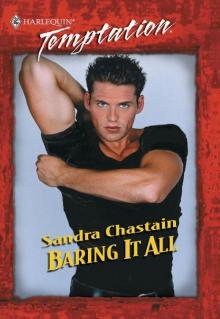 Baring It All (Mills & Boon Temptation)
Baring It All (Mills & Boon Temptation)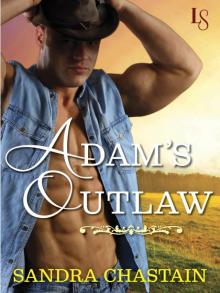 Adam’s Outlaw
Adam’s Outlaw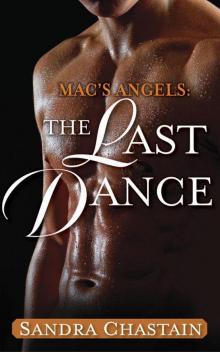 Mac's Angels: The Last Dance: A Loveswept Classic Romance
Mac's Angels: The Last Dance: A Loveswept Classic Romance Imaginary Lover
Imaginary Lover The Judge and the Gypsy
The Judge and the Gypsy Silver Bracelets: A Loveswept Contemporary Classic Romance
Silver Bracelets: A Loveswept Contemporary Classic Romance Penthouse Suite
Penthouse Suite Lean Mean Loving Machine: A Loveswept Classic Romance
Lean Mean Loving Machine: A Loveswept Classic Romance Joker's Wild
Joker's Wild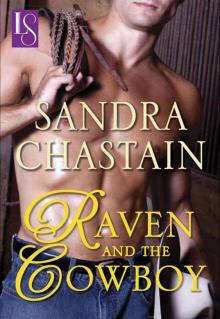 Raven and the Cowboy: A Loveswept Historical Romance
Raven and the Cowboy: A Loveswept Historical Romance Night Dreams
Night Dreams The Outlaw Bride
The Outlaw Bride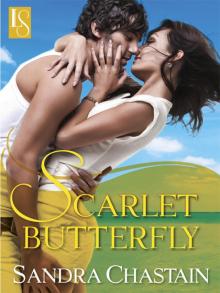 Scarlet Butterfly
Scarlet Butterfly Mac's Angels
Mac's Angels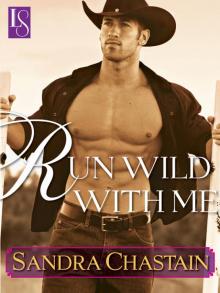 Run Wild With Me
Run Wild With Me Lean Mean Loving Machine
Lean Mean Loving Machine